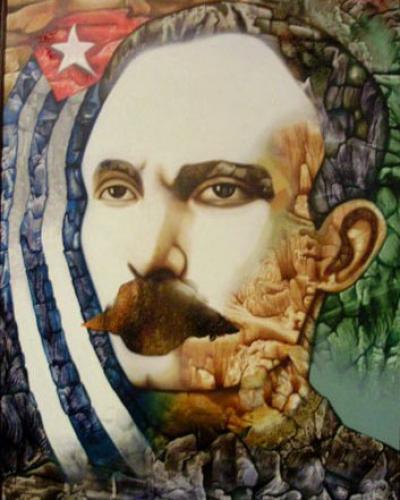GJ: Throughout his adult life Martí kept notebooks, sometimes no more than assorted scraps of paper stitched together by hand. He jotted down everything: snatches of poetry, citations from books that he was reading, random thoughts, both his own and other people’s aphorisms, the addresses of friends and contacts, arguments with himself or with a book, incidents from his day, jokes, and various other literary and philosophical musings in Spanish, French, English, Greek, Latin and German. Twenty of these notebooks remain. This is from notebook #1 from 1871:
JJ: North Americans put utility before sentiment. We put sentiment before utility. And when there is such a difference in organization, life, being; when they were selling when we were weeping; when we exchange their cold and calculating head for our imaginative head, and their hearts made of cotton and ships with a heart so special, so sensitive, so new that it can only be called a Cuban heart, how then can you ask us to govern ourselves by the same laws with which they govern themselves?
We imitate? No! We copy? No! It is good, they tell us. It is American, we say.
We believe because we need to believe. Our life does not resemble theirs, and on many points it must not become like theirs. Among us, sensibilities are extremely vehement. Our intelligence is less positive, our customs are purer: how can two different peoples be ruled by the same laws?
The American laws have given the north a high degree of prosperity and have also raised it to the highest degree of corruption. It has been metallized to make it prosper, Accursed be prosperity at such a cost.
GJ: Martí left virtually no aspect of life in the United States unexamined; news events were reported alongside the doings of high society, the struggles of the working classes, profiles of the leading men and women of the day, descriptions of elections, sporting events, famous trials, plays, buildings, education, family life, murders, and snatches of conversations overheard in the street. Taken together, the articles comprise one of the most sustained, detailed and perceptive portrayals of life in the United States ever written by an outside observer. Martí developed a kaleidoscopic new form of journalism that juxtaposed a dizzying diversity of stories, sometimes within a single sentence and mingled fact and poetry, the personal and the political, the heroic and the banal, the colossal and the petty, admiration and alarms.
In an article on the leisure/entertainment destination New York’s Coney Island Martí writes…
JJ: …yet it is well known that a sad melancholy steals over the men of our Hispanoamerican peoples who live here. They seek each other in vain, and however much the first impressions may have gratified their senses, enamoured their eyes, and dazzled and befuddled their minds, the anguish of solitude possesses them in the end. Nostalgia for a superior spiritual world invades and afflicts them; they feel like lambs with no mother nor shepherd, lost from the flock, and though their eyes may be dry, the frightened spirit breaks into a torrent of the bitterest tears because this great land is devoid of spirit.
These people eat quantity; we, class.
GJ: One of the things Martí found most dismaying about the United States was its iron-clad ignorance of Latin America. While that ignorance may have diminished since Martí’s time, it still, for the most part, extends to Martí himself. It is part of our resolve in these programs dedicated to his writings to help break down that international blind-spot.
For The Voice of José Martí I’m GJ
JJ: And I’m JJ. Thanks for listening.


